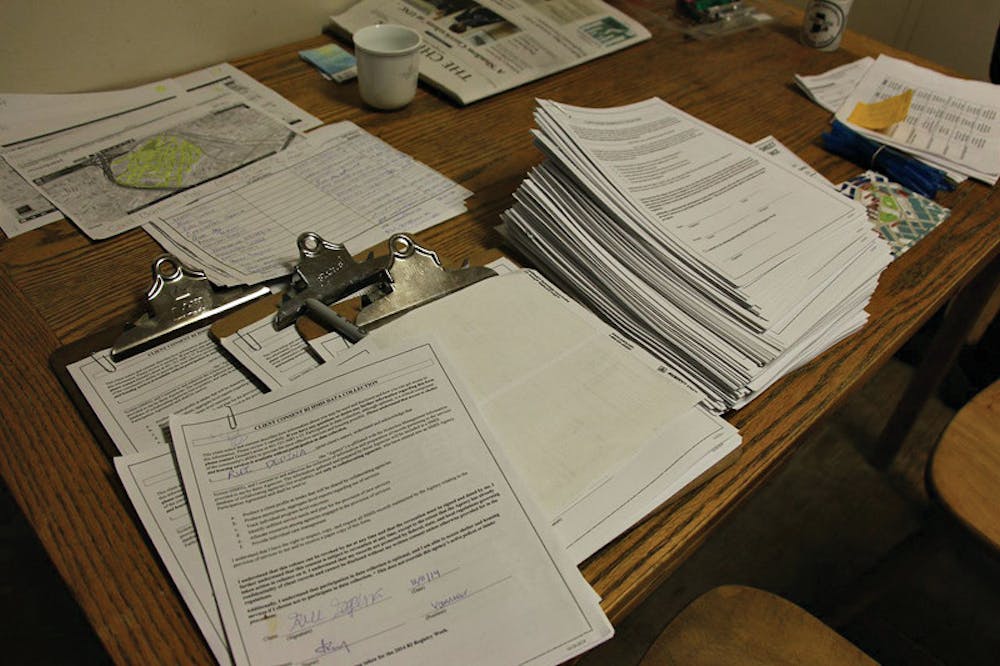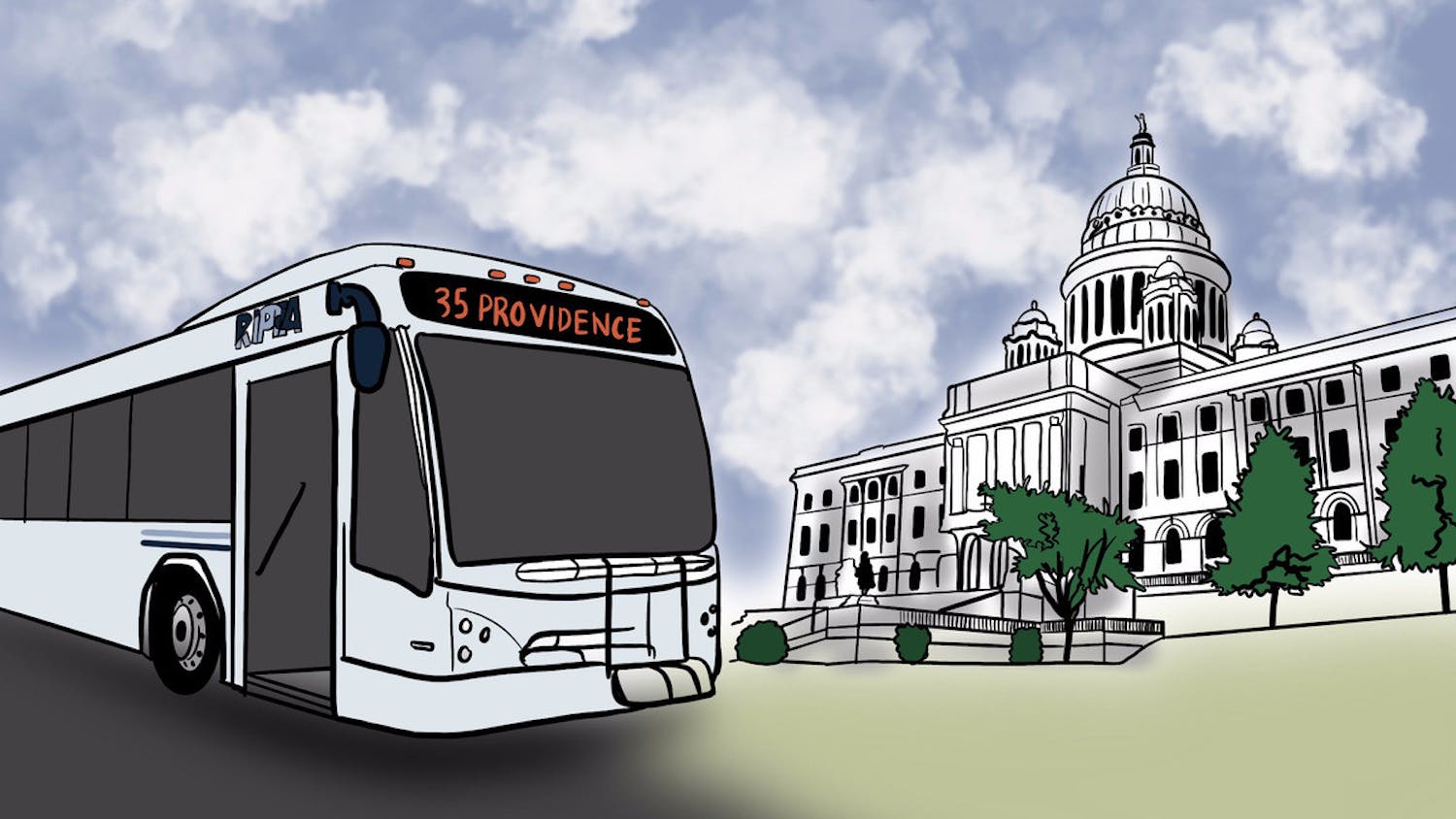Just an hour before heading out to survey people on the streets, Keenan Line ’18 received unsettling precautions: be careful with personal items, be ready to call 911 in case of an emergency and do not interact with hostile people. Though she realized that these were merely precautionary measures, Line admitted she felt “unnecessarily nervous,” and was worried about how strangers would treat college students who wore North Face jackets and had beds to sleep in every night.
Survey in hand, Line and her outreach team began their tedious investigations down Mathewson Street as part of the kickoff to the Zero: 2016 Campaign, an initiative launched by Community Solutions, a national non-profit organization committed to fostering resilience and value for vulnerable residents.
On Monday, Rhode Island took its first step toward an ambitious goal to eradicate chronic and veteran homelessness by launching “Registry Week.” The state is one of five so far — along with Connecticut, New Mexico, Utah and West Virginia — to participate in the campaign.
The Rhode Island Coalition for the Homeless, a public advocacy organization working to end homelessness in the state, is coordinating the state efforts for the national campaign. During the three nights of Registry Week, over 450 volunteers walked the streets of cities across the state, connecting homeless people to rehabilitative and housing services. They used the comprehensive survey Vulnerability Index-Service Prioritization and Decision Assistance Tool, known as the VI-SPDAT, to count the number of homeless residents and gauge their vulnerability.
“There’s a certain attractiveness to our geographic size to be able to do something like this and have it be effective,” said Jim Ryczek, executive director of RICH, adding that the scale of the problem in Rhode Island is manageable “if we really put our time and effort into fixing the system.”
In previous years, RICH conducted head counts of the homeless population, but this year, the state is streamlining the process by universally adopting the VI-SPDAT surveys. The survey respondents obtain a “Vulnerability Index Score” based on their housing situations. These scores are then compiled into a list, which RICH uses to match homeless individuals with appropriate federal, state and locally funded housing programs and rehabilitative services.
Though organizers seek to eliminate homelessness, Ryczek said he recognizes that “there will certainly be people who will fall into homelessness,” even after the campaign’s efforts. As a result, the organization’s ultimate goal is to expedite the process of rehousing and rehabilitation, he added.
“Shelters were never intended to be places where people lived. They were intended to be very, very short-term stabilizers,” Ryczek said. “We’re essentially getting our act together in approaching homelessness in Rhode Island, and if we do that, we can functionally end homelessness.”
Jana Foxe ’16, a coordinator for Housing Opportunities for People Everywhere, a student-run advocacy organization dedicated to ending homelessness, works as one of RICH’s on-campus connectors to bolster this mission. For Registry Week alone, HOPE — with help from the Swearer Center — recruited and trained about 200 Brown students to conduct the surveys across the state.
“The homeless do face a lot of misunderstanding from the wider community,” Foxe said, adding that homeless people face “a great deal of bigotry and hatred from people.”
“I believe in the right to housing and in ending homelessness as an important tool for societal progress in general,” Foxe said.
Members of HOPE actively tackle homelessness — what Foxe calls “a huge market failure, a huge welfare crisis and a huge humanitarian crisis” — by lobbying for pieces of legislation at the Rhode Island General Assembly. Recently, they advocated for the “Just Cause” bill, a tenants’ rights legislative measure passed in July that prevents the eviction of rent-paying tenants in foreclosed homes.
“We have enough people who believe in the dignity of the community and that no one should be without a place to call home,” Foxe said. “The only thing we need … is political will.”
Activists in the anti-homelessness campaign need Rhode Island’s elected officials to support a minimum wage hike, affordable housing assistance and “transparent banking laws” to help their mission, Foxe said.
On Monday, U.S. Rep. James Langevin, D-R.I., participated in Registry Week by conducting his own VI-SPDAT survey while on a visit to the Westerly Area Rest Meals Inc. Center. Langevin, who has been vocal about affordable housing and homelessness issues, told The Herald he supports the Zero: 2016 Campaign “because it is one of the first attempts of its kind to try and understand the root causes of chronic homelessness.”
At a roundtable discussion held at the Harrington Hall shelter Oct. 15, in-house clients and Rhode Island residents who had faced homelessness voiced their opinions on possible methods for approaching chronic homelessness. Langevin recounted how a majority of the roundtable participants advocated for rehabilitative services for the homeless.
Many people with mental illnesses or drug or alcohol addictions end up homeless, Langevin said. Communities need “more of those background services to help serve people that are in those situations to get their lives back on track.”
Ryczek lauded the state’s congressional delegation as “one of the most supportive in the country.” Langevin and U.S. Sen. Jack Reed, D-R.I., have pushed for legislation that “brings back funds to Rhode Island” from the Affordable Housing Trust Fund, Langevin said. Last year, Langevin introduced the Veterans Homebuyer Accessibility Act, which would give veterans an $8,000 tax credit to either purchase a home or to make their current homes more accessible.
Both Ryczek and Langevin encouraged Rhode Island residents to educate themselves and to reach out to their representatives. If representatives “heard from 10, 20, 30, 40 constituents,” they would be more attentive to addressing homelessness, Ryczek said.
After two hours of conducting surveys, Line and her outreach group were able to contact 10 homeless residents, taking a preliminary step toward future housing and rehabilitation. She acknowledged that the work was out of her comfort zone and even “highlighted the divide between life in the Brown bubble and the lives of many poor people outside it.”
“At the same time, the experience humanized these people and made them seem less like strangers,” Line said. “In that way, I feel like it lessened the divide.”

ADVERTISEMENT




